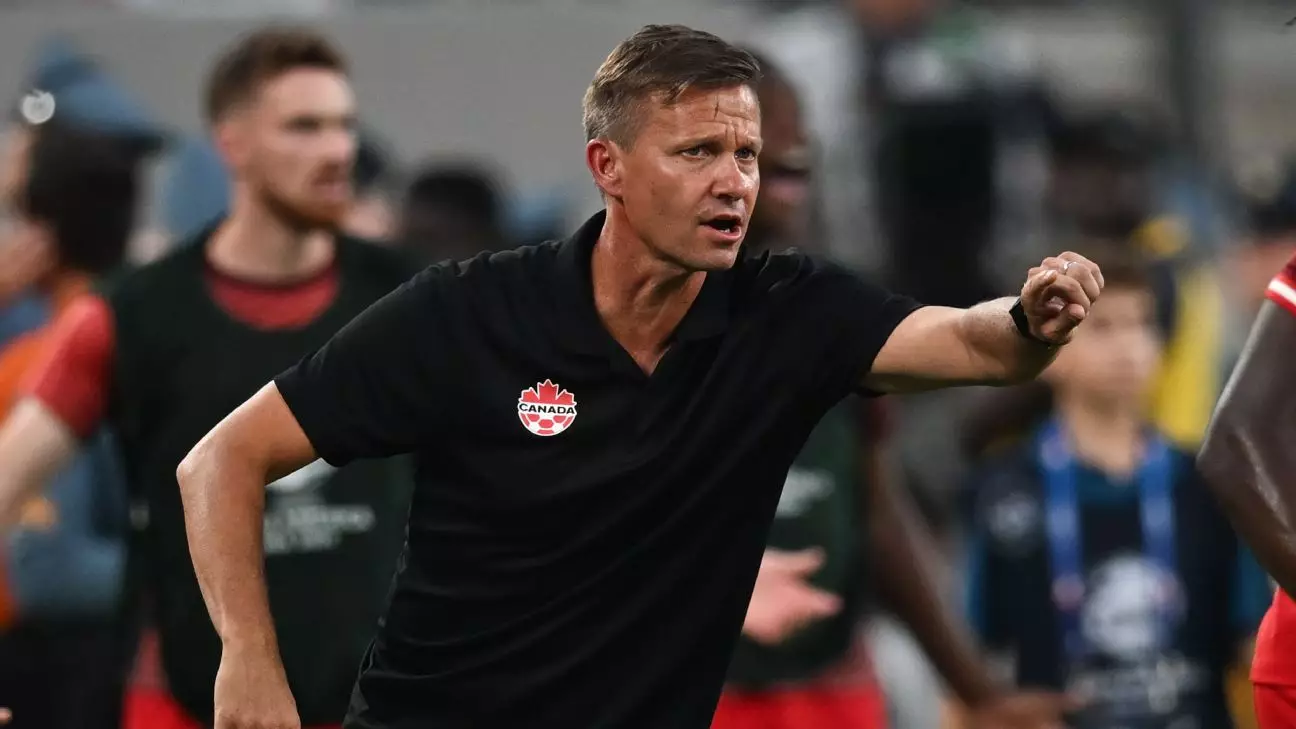In a sporting world where passion meets politics, Canada’s men’s national soccer team faces not just rivals on the field but obstacles off it as well. As the Concacaf Gold Cup approaches, head coach Jesse Marsch has spoken candidly about the potential barriers that may discourage Canadian fans from traveling to the United States. The political climate presents a significant hurdle, instilling apprehension among supporters who fear complications crossing the border.
The Shadow of Uncertainty at the U.S. Border
Marsch’s acknowledgment of fans’ trepidation captures the current reality: many Canadians are understandably anxious about traveling south, given recent reports of stringent immigration enforcement. His reference to the “sad” need to discuss these concerns underscores a troubling intertwining of sports and political issues, where the excitement of international competitions is dampened by the fear of administrative complications. Such circumstances force individuals to weigh their love of soccer against potential risks—a scenario that should never overshadow the spirit of sporting events.
Recent incidents involving prominent Canadians, like actress Jasmine Mooney’s prolonged detention by U.S. border agents, serve as chilling reminders of the real-life implications of complex immigration policies. Detainment for Canadians—often perceived as near-political allies—challenges the perception of the U.S. as a welcoming neighbor. The impact is visible, with Statistics Canada reporting significant declines in cross-border travel, suggesting that fans may stay home rather than confront the unpredictable nature of immigration checks.
The Stakes of the Tournament
As if the logistical challenges weren’t enough, Marsch’s squad faces elevated expectations during what is considered a pivotal tournament in the soccer calendar. Starting their Gold Cup journey against Honduras in Vancouver on June 17, Canada must capitalize on home advantage amidst the swirling uncertainties. With subsequent matches in Houston, the emphasis on fan support amplifies. Marsch articulately expresses his hope that the team’s aspirations for the finals won’t be hindered by external factors. The stakes have never been higher, and fan presence becomes a critical factor for motivation.
Moreover, as a shared host for the upcoming World Cup alongside the U.S. and Mexico, Canada’s soccer narrative is evolving. The importance of establishing a robust fan base through the Gold Cup cannot be understated. Fans invigorate players, providing morale that could propel the national team to unparalleled achievements. Marsch’s plea for undeterred support speaks to a collective desire for recognition on the world stage, something that transcends the boundaries of politics.
Coaching from the Sidelines
Compounding the challenges, Marsch faces a personal obstacle—a suspension that prevents him from coaching during crucial matches against Honduras and Curaçao. This predicament places additional pressure on the team, testing both their resilience and ability to adapt in high-stakes scenarios. Moreover, the absence of a figure like Marsch on the sidelines will be felt as he has a unique strategic insight crucial in tight situations.
Marsch’s storied previous coaching experiences at the likes of Montreal, New York Red Bulls, and Leeds United have equipped him with tactical insights to guide the team through challenges. However, with the clock ticking down to the tournament, developing the team’s identity in his absence becomes imperative. The collaboration between assistant coaches and the players will invariably face scrutiny, serving as a litmus test for the squad’s chemistry and preparation.
The Quest for Support
In a time rife with challenges, the pursuit of unity becomes essential for the Canadian team. The Gold Cup could serve as a rallying point, not only to enhance national pride but also to send a powerful message back to fans about the importance of showing up, together, as one. The potential for a narrative of resilience against a backdrop of political uncertainty is ripe for exploration.
In a sport where the roar of the crowd has the power to change the course of a game, it is imperative that fans overcome their reservations. Without a doubt, Marsch’s optimism is hopeful; as he noted, achieving greatness in this tournament is not just a goal—but a potential reality that could inspire a collective Canadian identity, leaving doubt behind as they seek glory on the field.


Leave a Reply